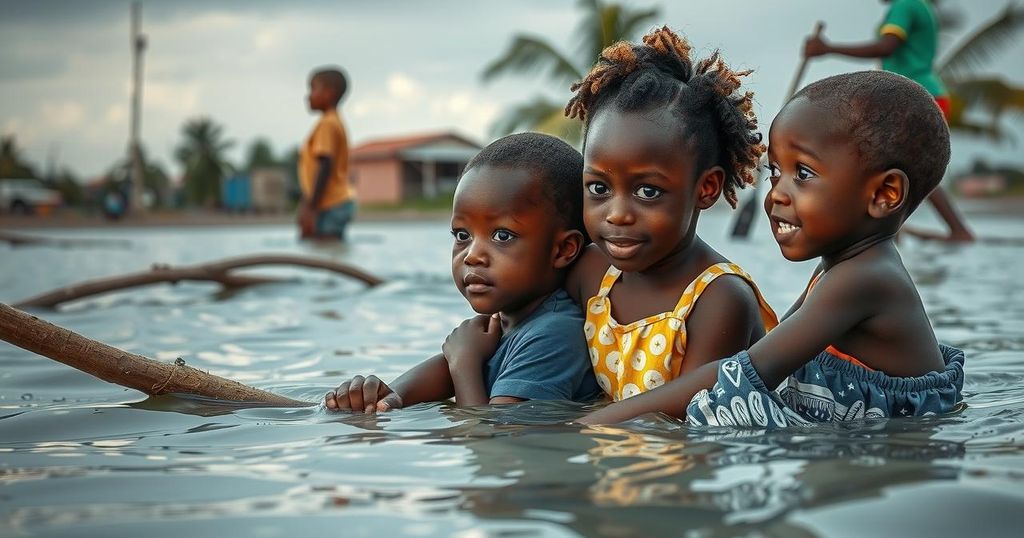Devastation of Cyclone Chido: Impact on Children and Communities in Mozambique
Cyclone Chido has impacted around 90,000 children in northern Mozambique, causing widespread destruction of homes and infrastructure, particularly in Cabo Delgado province. UNICEF reports that at least 174,000 people have been affected overall, with pressing humanitarian needs noted. The cyclone compounds the region’s existing vulnerabilities, which include conflict and food insecurity, prompting coordinated relief efforts from various UN agencies and partners.
Tropical Cyclone Chido has wreaked havoc in northern Mozambique, primarily affecting the Cabo Delgado province. Approximately 90,000 children have been impacted by the storm, which has resulted in the destruction of over 35,000 homes, displacement of numerous families, and significant damage to infrastructure, including classrooms and health facilities. The latest reports indicate that while 174,000 people have been directly affected, this figure may rise as further assessments are conducted. The storm has exacerbated existing challenges in a region already grappling with conflict and food insecurity.
The cyclone hit close to Pemba, resulting in widespread damage to civilian infrastructure, including electricity and communication systems, devastating an area already recognized as highly vulnerable to climate-related crises. “Mozambique is considered one of the most affected countries in the world by climate change and children were already experiencing several life-threatening emergencies before Cyclone Chido,” remarked Mary Louise Eagleton, UNICEF’s Representative in Mozambique. In response, UNICEF, alongside various UN agencies and local partners, is taking immediate actions to address the humanitarian needs presented by this disaster.
Cabo Delgado has faced longstanding challenges due to prolonged conflict, causing significant internal displacement, particularly among women and children. Cyclone Chido has further complicated the situation, damaging what limited recovery families had achieved. Additionally, the storm impacted Nampula and Niassa provinces, adversely affecting over 25,000 families and compromising essential water facilities in the area. The possibility of worsening the ongoing cholera outbreak looms amid the devastation.
In the wake of the cyclone, the UN refugee agency has swiftly provided essential aid to over 2,600 individuals in Pemba, delivering emergency supplies. Preliminary assessments suggest an urgent need for humanitarian assistance for roughly 190,000 people, as many rural areas remain inaccessible and their conditions remain unassessed. UN Secretary-General António Guterres has noted the ongoing efforts to deliver emergency assistance while also announcing that the UN is ready to extend further support as necessary.
The limited availability of emergency supplies poses challenges to the response efforts, but the Emergency Relief Coordinator has allocated $4 million to bolster the humanitarian response in Mozambique. Concurrently, the World Food Programme is set to scale up its operations to assist the increasing number of individuals experiencing food insecurity, projected to affect about 3.3 million people in the upcoming year. Cyclone Chido’s impacts were also felt in Mayotte and southern Malawi, highlighting the extensive reach of this natural disaster and the critical need for humanitarian assistance in affected regions.
Cyclone Chido, a natural disaster fueled by climate change, struck northern Mozambique, amplifying pre-existing vulnerabilities exacerbated by years of conflict, drought, and disease outbreaks. The Cabo Delgado province, already experiencing humanitarian crises, faced increased damages as the cyclone swept through, leading to substantial destruction of homes, classrooms, and health facilities. The region’s struggles with food insecurity further complicate recovery, as aid efforts scramble to address the urgent needs of displaced families and children, who bear the brunt of these compounded crises. This situation requires a comprehensive humanitarian response, underscoring the critical role of agencies like UNICEF and the coordination of local and international partners in providing relief and assistance to affected communities.
In summary, Cyclone Chido has severely impacted Mozambique, especially within Cabo Delgado province, affecting approximately 90,000 children and displacing thousands of families. The devastation includes damage to vital infrastructure and exacerbation of existing humanitarian crises. Urgent assistance is needed to support the affected population, and various UN agencies and partners are mobilizing efforts to provide relief and enhance recovery in the wake of the storm. The situation underscores the ongoing challenges faced by Mozambique in the face of climate change and conflict.
Original Source: news.un.org




Post Comment